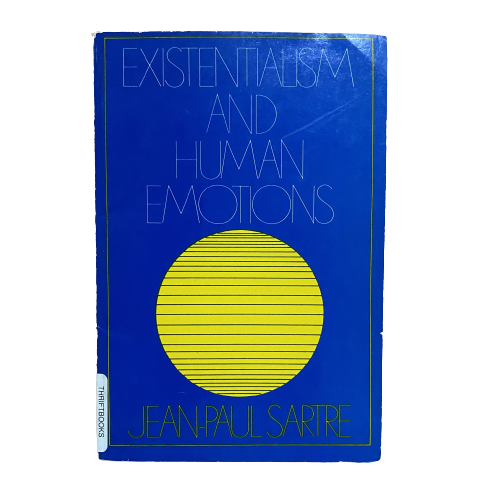
“Man is nothing else but what he makes of himself.”
“I can always choose, but I ought to know that if I do not choose, I am still choosing.”
“Someone will say, "I did not ask to be born." This is a naive way of throwing greater emphasis on our facticity. I am responsible for everything, in fact,
except for my very responsibility, for I am not the foundation of my being. Therefore everything takes place as if I were compelled to be responsible. I am abandoned in the world, not in the sense that I might remain abandoned and passive in a hostile universe like a board floating on the water, but rather in the sense that I find myself suddenly alone and without help, engaged in a world for which I bear the whole responsibility without being able, whatever I do, to tear myself away from this responsibility for an instant. For I am responsible for my very desire of fleeing responsibilities. To make myself passive in the world, to refuse to act upon things and upon Others is still to choose myself, and suicide is one mode among others of being-in-the-world. Yet I find an absolute responsibility for the fact that my facticity (here the fact of my birth) is directly inapprehensible and even inconceivable, for this fact of my birth never appears as a brute fact but always across a projective reconstruction of my for-itself. I am ashamed of being born or I am astonished at it or I rejoice over it, or in attempting to get rid of my life I affirm that I live and I assume this life as bad. Thus in a certain sense I choose being born.”
“Existentialism's first move is to make every man aware of what he is and to make the full responsibility of his existence rest on him.”
“Every man ought to say to himself, "Am I really the kind of man who has the right to act in such a way that humanity might guide itself by my actions?”
“I can always choose, but I ought to know that if I do not choose, I am still choosing.”
“Someone will say, "I did not ask to be born." This is a naive way of throwing greater emphasis on our facticity. I am responsible for everything, in fact,
except for my very responsibility, for I am not the foundation of my being. Therefore everything takes place as if I were compelled to be responsible. I am abandoned in the world, not in the sense that I might remain abandoned and passive in a hostile universe like a board floating on the water, but rather in the sense that I find myself suddenly alone and without help, engaged in a world for which I bear the whole responsibility without being able, whatever I do, to tear myself away from this responsibility for an instant. For I am responsible for my very desire of fleeing responsibilities. To make myself passive in the world, to refuse to act upon things and upon Others is still to choose myself, and suicide is one mode among others of being-in-the-world. Yet I find an absolute responsibility for the fact that my facticity (here the fact of my birth) is directly inapprehensible and even inconceivable, for this fact of my birth never appears as a brute fact but always across a projective reconstruction of my for-itself. I am ashamed of being born or I am astonished at it or I rejoice over it, or in attempting to get rid of my life I affirm that I live and I assume this life as bad. Thus in a certain sense I choose being born.”
“Existentialism's first move is to make every man aware of what he is and to make the full responsibility of his existence rest on him.”
“Every man ought to say to himself, "Am I really the kind of man who has the right to act in such a way that humanity might guide itself by my actions?”
